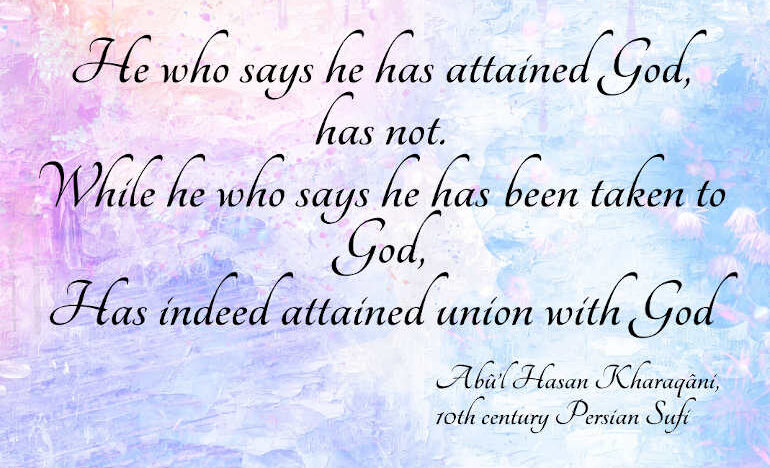Surrendering to God: “Two Can Not Live in One Heart”

By Kathy Keary
Part 6. The full series is here: The Contemplative Spirit of Islam.
The theme of surrendering our very being to God runs through both the Old and New Testaments like a sacred thread. One such passage serves as a mantra as I acknowledge my perpetual need to yield to Divine Wisdom:
Trust in the Lord with all your heart.
On your own intelligence rely not.
In all your ways be mindful of him
and he will make straight your path.—Proverbs 3:5-6
The passage that pierces my heart are the words of Jesus in the Garden of Gethsemane — a selfless stance that epitomizes the act of surrendering: “My Father, if it is possible, may this cup be taken from me. Yet not as I will, but as you will” Mt 26:39.
This theme is prevalent in the three Abrahamic faiths including Islam. As a matter of fact, the word Islam means to “surrender in peace.” A Muslim is instructed to leave behind the “little self” in exchange for union with the “higher self.” The will of God becomes the driving force that stands in opposition to the ego (Gems, 101).
Surrender is one of the three principles of Islam that stands alongside the principles of faith and moral virtue. Muslims believe that they can be freed from slavery to their ego by being a slave to God. In the words of Imam Jamal Rahman in his book, Fragrance of Faith: The Enlightened Heart of Islam:
Surrender is the lifelong practice of listening to and acting on the needs of the soul, allowing the Divine and not the ego to be the center of Reality. Surrender becomes the soul’s dynamic role in the Will of God giving up limited will to participate in Cosmic Will. This giving up is not a resignation, but a deep honoring of one’s real self (Fragrance, 23).
Two examples from the Qur’an calling for submission to God are as follows:
- Whatever creature is in the Heavens and on the Earth bows to God (only), and the angels (too), and they do not show pride. They fear their Lord supreme, and they do what they are commanded (The Bee 16:49-50).
- Say, (Prophet Muhammad): I am commanded to serve God, to be sincere to Him in obedience. And I am commanded to be the first of those who submit (The Companies 39:11). (St. Michael, 307, 309)
The Sufi teacher, Llewellyn Vaughan-Lee teaches that when the ego rules the human heart, there is no room for the Divine presence to dwell. “Two cannot live in one heart, either the ego or the Self must go” (143).
Vaughan-Lee also emphasizes that surrendering to God depends on grace. An individual needs to even relinquish their desire to progress along the spiritual path and their longing to draw closer to God. “We have to surrender every effort in order to be taken by God.” According to a 10th century Persian Sufi, Abû’l Hasan Kharaqâni:
He who says he has attained God, has not,
While he who says he has been taken to God
Has indeed attained union with God (144).
Muslims exemplify the principle of surrender in their prayer practice. Consistent with Muhammed’s vision of angels bowing and prostrating before God as they professed prayers of praise and thanksgiving, Muslims engage in prayer five times a day that involves standing, bowing, prostrating, and sitting in “sweet surrender to God” as they recite verses from the Qur’an. “Bow down in adoration and draw closer,” instructs the Qur’an (Gems, 107, 108).
Muslims also engage in a rigorous fast during the month-long Ramadan as a prayer of thanksgiving. As the poet, Rumi, explains:
There is a hidden sweetness
in the stomach’s emptiness.
We are lutes, no more, no less.
If the soundbox is stuffed
full of anything, no music.
If the brain and the belly
are burning clean with fasting,
every moment a new song
comes out of the fire. (LA Quaker)
Rahman asserts that as we grow spiritually, we loosen our tight rein on the need to control. We come to firmly believe that God is acutely aware of our needs and that we are barriers preventing his influence. As we surrender our grip, “we relax into the embrace of God and feel a peace that is indescribable.” Allah described his believers to Muhammed: “I become the hearing by which he hears, the sight by which he sees, the hand with which he grasps, and the foot with which he walks” (Fragrance 47).
Rahman offers a practice to facilitate the arduous task of surrendering to God. He suggests that we frequently ask ourselves if our speech and actions stem from a place of surrender to the attributes of God including love, compassion, truth, and beauty. Or to the contrary, are our words and deeds rooted from a place of the “little self” characterized by fear, anger, pettiness, and jealousy (Gems, 102)?
Stay tuned for our continued articles on the contemplative nature of Islam.
NOTE: The Renewal Center staff will be leading a book discussion on Rahman’s book Spiritual Gems of Islam on Saturdays and Tuesdays in June.
References
“The joy of fasting according to Rumi.” LA Quaker. August 14, 2010. https://laquaker.blogpost.com/2010/08/joy-of-fasting-according-to-rumi.html
St. Michael, Louis. Jesus and Muhammad: Their Messages, Side by Side. Rising Myrrh Press, April 2018.
Rahman, Jamal. Spiritual Gems of Islam: Insights and Practices from the Qur’an, Hadith, Rumi and Muslin Teaching Stories to Enlighten the Heart and Mind. USA: Skylight Path Publishing, 2013.
Rahman, Jamal. The Fragrance of Faith: The Enlightened Heart of Islam. Bath, England: The Book Foundation, 2004.
Vaughan-Lee, Llewellyn. Sufism: The Transformation of the Heart. Point Reyes, California: The Golden Sufi Center, 1995.
[Kathy Keary, a Precious Blood Companion and spiritual director, holds a master’s degree in theological studies and is a graduate of the Atchison Benedictine’s Sophia Center’s Souljourners Program, an intense study of spirituality and spiritual direction. Kathy believes that the divine is present and active in all of life and encourages others to be awakened to the God in all including the divine within. She enjoys accompanying others on their journey to wholeness discovering the person they were created to be.]
We’d Like to Hear From You!
We’d like to know what you think about this article. Send us a comment using the form below. Do you have a suggestion? Is there something you want to learn more about? Send us a note.
Related

Making a Banner for Lent Part 2
A Coffee with Padre Video
Fr. Timothy finishes his Lenten banner and continues his reflections on how colors and materials become potent symbols that bring the Lenten season alive. The final banner serves as a visual reminder of our spiritual journeys.

Lent Video Four — Guided Meditation: ‘Traveling in the Dust of the Rabbi’
In this video, Fr. Ron reads the Gospel, Mark 1:29-34, for you and then leads you through a guided meditation, taking you deeper into that story. He calls this experience “an example of traveling in the dust of the rabbi.”
Categories
Assembling God's Puzzle Coffee with Padre Cooking & Spirituality Encounters of the 4th Kind Family Matters Reflections on the Eucharsitic Prayers Spiritual Resources Taize Prayers The Contemplative Life Traveling with Pilgrims of Hope Uncategorized Videos Week of Prayer for Uhristian Unity When you need a little help
